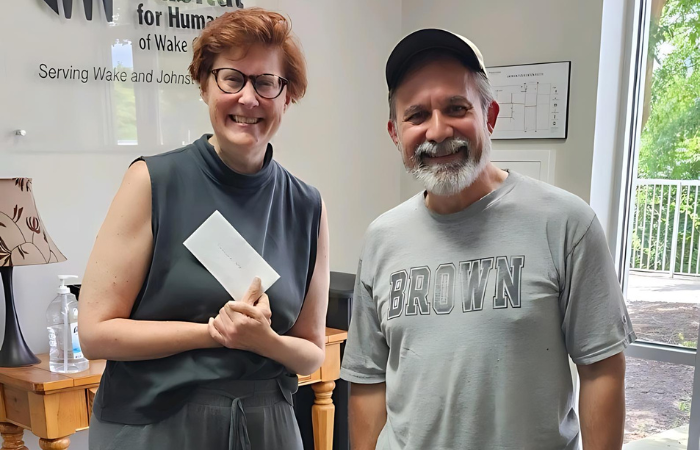
Reflection by Steve LaSala, Habitat Coordinator at Beth Meyer Synagogue an architect of the Interfaith Build
Good morning, and welcome to this year's Habitat Wake Interfaith Build. We are all here because we believe that our duty to God and the practice of our faith traditions encourage it. But I'd like to spend a little time going deeper into those notions.
In the debates recorded in the Talmud, the ancient rabbis spend a good deal of time and effort trying to translate the general and sometimes contradictory instructions of scripture into more concrete principles and actions that constitute a fulfilling life in harmony with God's plan. For instance, at one point (Sotah 14a) they state:
"Follow the Lord your God" (Deut. 13:5) What does this mean? Is it possible for a mortal to follow God's presence? The verse means to teach us that we should follow the attributes of the Holy One. As he clothes the naked, you should clothe the naked (Gen 3:21). The bible teaches that the Holy One visited the sick; you should visit the sick (Gen. 18:1 This is deemed to be immediately following Abraham's circumcision mentioned in the previous chapter). The Holy One comforted those who mourned; you should comfort those who mourn (Gen 25:11). The Holy One buried the dead; you should bury the dead (Deut 34:6).
And we with Habitat might well extend this to; "you should house those who need housing".
All these actions fall under the umbrella concept of "gemilut chasadim", or "acts of loving kindness". And indeed, the Talmud continues on to note that first and last actions on the list above can be seen to bracket the rest of the Torah. The story begins and ends with acts of kindness, love, and care.
But we can go deeper. In the very center of the Torah, chapter 19 of the book of Leviticus, we find the famous "holiness code". It begins with the general principle that "You must be holy, since I am God your Lord, and I am holy [and we are structuring our existence to live in relationship to each other] (Lev. 19:1).
And the text then proceeds to specifics: respect your parents, keep the Sabbath, provide for the poor (v.9-10), don't steal or lie or fail to pay what you owe, etc, etc. Eighteen verses on, we come to what many commentators, including Jesus (Matthew 22:35-40) and his contemporary Rabbi Hillel (Torah on one foot) considered the crux of the matter; "You must love your neighbor as you love yourself." How you go about that can take many forms, but it's a 'mitzvah', a commandment. We are commanded to be here, or somewhere else equally significant. Everybody has to do something to make the world more congruent with God's ideal.
So, I invite you to join me in the practice of the 16th-century mystic Isaac Luria of Safed, who would begin his morning prayers by stating:
Hareini mekabel/mekabelet alay mitzvat haborei; ve-ahavtah le-re'acha kamocha"
"I hereby accept upon myself my Creator's commandment: to love my neighbor as myself."
And now we are ready to build.